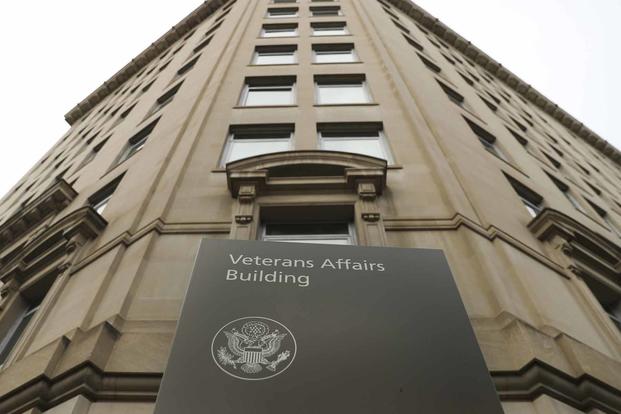The opinions expressed in this op-ed are those of the authors and do not necessarily reflect the views of Military.com. If you would like to submit your own commentary, please send your article to opinions@military.com for consideration.
In recent weeks, members of the House and Senate Committees of Veterans' Affairs have been in intense negotiations hammering out a compromise between three bills that could endanger the nation's veteran-centric health care system -- the Veterans Health Administration, or VHA. The competing bills were introduced by Sens. Jerry Moran, R-Kan., and Jon Tester, D-Mont., and Rep. Mariannette Miller-Meeks, R-Iowa.
If the language in those bills isn't radically changed in the eventual compromise, harms produced by a decade of outsourcing of veterans' health care will only be exacerbated.
Since 2015, $150 billion has been channeled to private-sector providers. Should more patients and taxpayer dollars be diverted into the private sector, the VHA will cease to be able to effectively serve its 9 million enrolled veterans. It could also jeopardize the role the VHA plays as one of the nation's leading research powerhouses, in teaching the majority of the nation's health care professional workforce, and responding to national emergencies.
As one clinical leader at a VHA medical center, who was granted anonymity in order to avoid retaliation for speaking without permission, predicted, "If sending patients to the private sector isn't reversed and soon, in five years the VHA will no longer be a provider but only an insurance payer. The unique model of comprehensive care we provide veterans and the services we give to the nation will disappear."
The root of the current problem stems from the passages of the Choice Act in 2014 and the VA Mission Act in 2018, which created the private-sector Veterans Community Care Program, or VCCP. The formation of the VCCP could have led to a modest use of the private health care sector to supplement the VHA when veterans were unable to get care in a timely fashion. But, determined to privatize the VHA, the secretary of the Department of Veterans Affairs under then-President Donald Trump, Robert Wilkie, opened eligibility, ensuring that millions of veterans would be outsourced.
Since the program began, studies have documented that wait times for non-VA appointments are longer, on average, than those at the VHA, while quality is lower (sometimes dangerously so).
Nonetheless, Congress has allowed VCCP usage to metastasize, growing by an astonishing 17% a year, with costs quadrupling since 2014. VCCP expenses now consume one-third of the VHA's clinical care budget. To cover those outlays, VHA leaders have just announced a massive slowing of hiring, even though hundreds of thousands of new veterans who suffered service-related toxic exposures are entering the system.
A compromise bill could make things far worse. Particularly problematic would be a provision that allows veterans to schedule appointments for vision or hearing services without VHA authorization. Allowing veterans to bypass the VHA for a few services inevitably opens the door to self-referral for countless others. That was the position advocated by organizations who recently told Congress that veterans should likewise be able to make appointments in the private sector for mental health, substance use, skin, feet, diabetes and prosthetics care, and just send the bill to the VHA.
In a report to Congress in 2022, VA Secretary Denis McDonough warned that this kind of relentless outsourcing of veteran care to the private sector could create a "'spiral effect' in some areas, where workload and talent are shifting externally and thus threaten to harm VA."
Two years later, this dire "spiral effect" has become a reality. Exploding community care costs have resulted in a $4 billion to $5 billion deficit. VHA medical center directors have been told they must drastically limit recruitment. Clinical leaders at multiple facilities who asked that their names not be published told us that at least 30 to 50 open mental health positions at their sites have been left unfilled or entirely eliminated, even though there is demand for services. Initial job offers have been rescinded, including those to well-qualified candidates who are finishing their clinical training at the VHA. A memo was recently issued ordering all job announcements on USAJOBS to be withdrawn.
To prevent the eventual collapse of the health-care system that most veterans support, any compromise on the three bills under consideration must drop self-referral provisions, as well as impose the same drive time and wait time standards to which VHA must adhere on private-sector providers. Congress should also require VCCP providers to meet the same quality metrics and undergo the same training in veteran-specific conditions required of VHA staff. Congress must allocate funding that ensures VHA facilities have sufficient staffing to fully meet demand so that they never have to turn veterans away because of hiring slowdowns and budget shortfalls.
Ultimately, the only way to maintain and improve the veterans' health care system is to end stealth privatization. Should VA leaders and Congress need a model for such a dramatic policy reversal, they have only to look at the Department of Defense. Recognizing that privatizing the Military Health System over the last two decades had produced long delays, lower-quality care and higher cost, the Pentagon just announced that it will not only bring outsourced care back into its own health system, but also strengthen it.
"Our service members, their families, other beneficiaries and all those cared for by military medicine will be better served when we rebuild [military treat facility] capacity," Deputy Defense Secretary Kathleen Hicks wrote.
Our veterans deserve the same.
-- Suzanne Gordon and Russell Lemle are senior policy analysts for the Veterans Healthcare Policy Institute.











